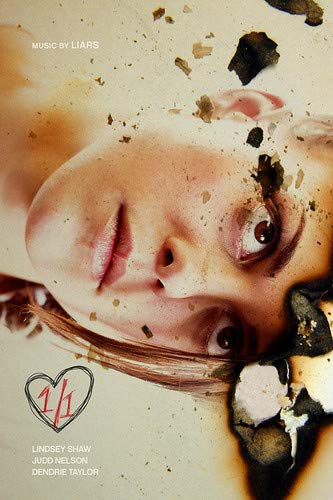
Plenty of us know Lindsey Shaw as Jennifer “Moze” Mosely from the Nickelodeon television series Ned’s Declassified School Survival Guide. We remember her as the sweet and brainy best friend of the titular main character. Well, in the latest heavyweight drama 1/1, she gets to take a much darker turn. As a young woman coming to grips with her troubled small town life, Shaw is quite brilliant but manages to be the film’s saving grace. She does carry the picture on her shoulders well enough. However, the film surrounding her is unfortunately, a bit of a mess.
There are moments of brilliance to be found. Also, director Jeremy Phillips does attempt to take a conventional storyline and make it feel fresh thanks to his filmmaking aesthetics. However, there are some slight narrative flaws that hinder the picture.
The storyline is as follows. Lindsey Shaw plays Lissa, a twenty-year-old girl trapped in her idyllic small town in rural Pennsylvania. But her world becomes shattered once she undergoes a pregnancy test. Before, during, and after the test takes place, Lissa is forced to re-examine her troubled life. Among the things she must confront is her troubled relationship with her mother Joan (Dendrie Taylor).
The subplot involving Lissa and Joan is, in my opinion, the biggest highlight of the film. It isn’t explored until later in the third act but when we get to that point, that is where the film throws its biggest emotional punch. Their big confrontation takes place at a dinner table where they become brutally honest with one another about their insecurities and hypocrisies. Joan tries telling Lissa how she complains about living in her small town but doesn’t attempt to do something about it. However, Lissa retorts by telling Joan how secretive she’s been about the internal struggles her deceased father (Judd Nelson) went through.
It’s also a moment where we get a clearer idea of what kind of character Lissa is. Up until then, it feels like there isn’t much character development. Mainly because there is a great emphasis on letting the camera continuously focus on Lisa, letting us get a slight glimpse into her thought process. Because the editing is quite choppy, it doesn’t seem to aid Lissa’s development either. When we’re about to get a glimpse of Lissa’s personality, the picture would cut away to a montage that doesn’t add much substance. Not to mention, there is a use of narrative exposition that gets heavy to the point where it is used in scenes that don’t require narration.
That’s why the confrontation scene Lissa and Joan was a major highlight. There’s no unneeded exposition and aside from a flashback scene, no choppy editing. Its main focus is on the actresses and their amazing performances. It is understandable that Jeremy Phillips is attempting to aim for a film with a simplistic storyline to possess illustrative techniques like its montages, scenes shot in black and white, etc.. But it probably could have benefitted from having a more bare bones approach.
Aside from its narrative flaws, 1/1 still manages to thrive thanks to its quietly commanding, leading performance by Lindsey Shaw. It also makes an admirable attempt to stray from the typical coming of age narrative thanks to the filmmaking efforts by Jeremy Phillips. But even if it didn’t fully pan out, there’s still room for improvement because it’s clear Phillips has a particular filmmaking voice.